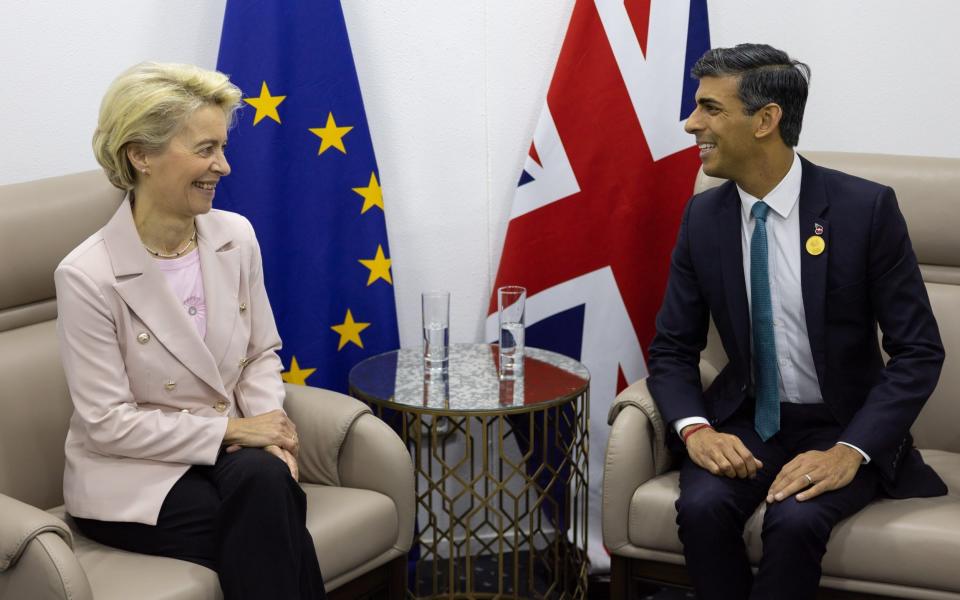Baffling Brexit plan will wreck trade, says M&S chief

The chairman of Marks & Spencer has called plans to ease post-Brexit trade "baffling" and "overbearing", as he became the latest business leader to attack the Government over its economic policy.
In a broadside on proposals for solving the Northern Irish Protocol stand-off, Archie Norman said the approach could force prices higher and give EU companies an advantage over British competitors.
The comments from Mr Norman, a former Tory MP, come after fellow industry leaders have also raised the alarm about the direction of the Government.
Dyson founder Sir James Dyson last week accused the Government of a “stupid” economic approach, while the director-general of Confederation of British Industry (CBI) questioned the lack of a “strategy”.
Mr Norman's criticisms come in a letter to the Foreign Secretary, excerpts of which have been seen by The Telegraph, which single out proposals for packaging changes.

Forcing companies to put “Northern Ireland only” or “UK wide” labelling on packages to avoid burdensome customs checks would drive up costs for supermarkets and producers, he argues.
Mr Norman said: “The overbearing costs of a labelling regime would raise prices and reduce choice for consumers, further disadvantage UK farmers and suppliers and impact UK retailers competitiveness in other international markets.
“The simple fact is retailers already operate in real time digital information - day or night, at the click of a button, we can locate our products be that in a depot, in transit or in a store.
“In a digital era – when one tap of a mobile can check-in a customer at store and locate their order in under 60 seconds, it’s baffling that the Government and EU have rewound four decades to discuss an expensive ‘solution’ involving stickers & labelling.”
On Thursday, Rishi Sunak will attempt to rally ministerial support behind his five newly announced promises, including halving inflation by the end of the year, in a rare “away day” with his Cabinet.
On Friday, Jeremy Hunt, the Chancellor, will double down on that inflation target, using a speech to push back on Tory MPs demanding tax cuts by insisting getting prices down is the key to growth.
The tensions over economic policy and the timing of tax cuts are set to dominate debate ahead of the Budget on March 15.
Mr Sunk and Mr Hunt have both repeatedly said they want to cut taxes when they can, but argue the priority now must be bringing down inflation, which is at an annual rate of around 10pc.
Government figures continue to point to the implosion of Ms Truss’s tax-cutting “mini” Budget last autumn, which sent the pound sinking and interest rates soaring, leading to her ouster from Number 10.
Mr Hunt will reiterate that message in a speech designed to rebut calls for tax cuts in his March Budget and underscore the pressures on Treasury revenues.
A Treasury source told The Telegraph: “The single biggest barrier to economic growth is 10pc inflation. You’re not going to grow the economy with inflation that high. It is the cause of industrial unrest, it is eroding the pound in people’s pockets and squeezing public services. You can have a thousand policies to promote growth, but without tackling inflation no one of them will work."
Trying to ensure Northern Ireland can freely trade with the mainland UK while also avoiding physical checks on the border with Ireland has been one of the thorniest Brexit issues.
A customs border down the Irish Sea was effectively created when the UK signed the Northern Ireland Protocol, which set out the province's terms of trade after Brexit.
Since then both Liz Truss and Mr Sunak have attempted to renegotiate that deal, with the UK threatening to unilaterally change the trade terms unless a new agreement is reached.
With pressure from Washington DC, Mr Sunak is hoping to agree a new deal by April, in time for the 25th anniversary of the Good Friday Agreement, which was a historic moment in the peace process.
Using different product labelling could theoretically ease the need for customs checks at the border. But Mr Norman argues in his letter that it would send costs soaring for producers.
At one point he warns: “A costly labelling solution will mean customers will be hit by reduced ranges, higher prices – at a time of huge inflation and when the economy in Northern Ireland is already disadvantaged – and a worsening of availability.”
At another he says: “This proposal adds cost, labour and complexity at a time when the supply base really does not need it and is struggling to stay on its feet to the specific advantage of EU producers.”
The exact labelling changes being proposed by London and Brussels is unclear, given talks remain behind closed doors - though some form of change has been floated in public.
Meanwhile the Treasury’s approach to tackling the twin challenges of lowering inflation and trying to minimise the recession forecasted for this year has faced recent criticism from senior businessmen.

In a piece for The Telegraph, Sir James spoke out against tax rises and new regulations, dubbing the approach “as short-sighted as it is stupid”.
Sir Martin Sorrell, chief of advertising group S4 Capital, backed up Sir James the next day, saying: “He's right. We need a long term growth plan.”
Tony Danker of the CBI has warned: “Money is leaving the UK. Investors are freezing up and the heart of the problem is that we don’t have a strategy.”
And Tesco chairman John Allan recently said the only way to raise living standards was with a “really serious, thought-through, long-term growth plan”.
At the heart of Tory tensions about economic policy are tax cuts - an approach the party has traditionally championed and made a defining plank of successive election campaigns.
But government sources have repeatedly insisted inflation has to be brought down first.
A Treasury source said: “[Inflation] is the reason the IMF is predicting a third of the world economy will be in recession this year.
“It is why central banks across the world are raising interest rates, pushing up the cost of mortgages and business loans. Halving inflation this year is our primary mission, and the Chancellor will not do anything that makes that job harder.”
That argument is countered by a number of increasingly vocal Tory MPs who argue with signs of inflation having peaked that cutting taxes would help stave off the looming recession.
Responding to Mr Norman’s letter, a UK government spokesman said: “The Protocol is causing real problems in Northern Ireland. These include trade disruption and diversion, significant costs and bureaucracy for traders.
“It’s our preference to resolve these problems through talks, and the Government is engaging in constructive dialogue with the EU to find solutions.”

 Yahoo News
Yahoo News 